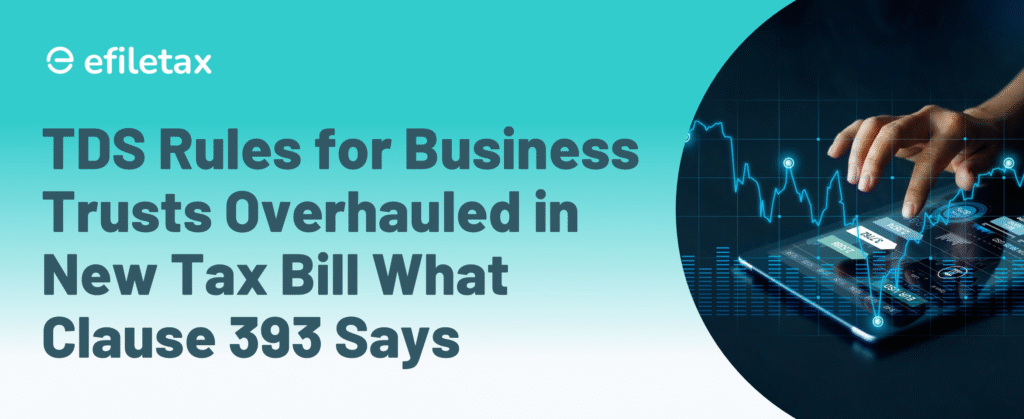
TDS on Business Trusts: What the 2025 Income Tax Bill Changes
The TDS on business trusts has been redefined under the Income Tax Bill, 2025, bringing clarity to taxation of income distributed by REITs and InvITs. These changes aim to streamline the framework and align it with global best practices, especially for real estate and infrastructure investment vehicles.
Let’s decode what changes and how they affect you.
What are Business Trusts?
Business trusts refer to Real Estate Investment Trusts (REITs) and Infrastructure Investment Trusts (InvITs), governed by SEBI. They pool investments from multiple investors and distribute income from rent, interest, dividends, or capital gains.
These were granted pass-through status under the Income-tax Act, meaning income is taxed in the hands of investors, not at the trust level.
Why the Change in TDS Framework?
The Income Tax Bill, 2025 aims to:
- Align TDS provisions with the nature of income distributed
- Avoid double taxation and confusion in withholding
- Ensure ease of compliance for trusts and unitholders
Clause-wise TDS Changes in the 2025 Bill
The following clauses are relevant from Chapter XXVIII – Deduction of Tax at Source in the Income Tax Bill, 2025.
1. Clause 393(1) – Interest Income (Table S. No. 4(ii))
| Nature of Income | Recipient Type | TDS Rate |
|---|---|---|
| Interest (other than business income) | Non-resident unitholders | 5% |
This clarifies the rate applicable on interest income paid by the business trust to a non-resident, aligning with earlier Sec. 194LBA.
2. Clause 393(2) – Dividend Income (Table S. No. 6 & 7)
| Nature of Income | Recipient Type | TDS Rate |
|---|---|---|
| Dividends (taxable) | Resident unitholders | 10% (above ₹5,000) |
| Dividends (taxable) | Non-resident unitholders | 20% or DTAA rate |
🟡 Note: If the dividend has been exempted in the hands of the business trust (due to underlying exemption u/s 10(34)), there is no TDS.
3. Clause 393(4) – Specified Other Incomes (Table S. No. 5, 13)
| Nature of Income | Recipient | TDS Rate |
|---|---|---|
| Rental or Lease Income | REITs to any resident | 10% |
| Other distributions (capital gains etc.) | Resident unitholders | 10%, if taxable |
These provisions close earlier gaps where capital gains or certain lease payments were not clearly addressed for TDS.
Legal and Structural Rationale
- These clauses reflect a restructured version of Section 194LBA and 194LBB.
- TDS now depends on income type + residency status, not a one-size-fits-all deduction.
- The 2025 Bill provides separate schedules and clauses, ensuring traceability.
📘 Source: Income Tax Bill, 2025 | Clause 393(1), (2), and (4)
Refer to the official document
Practical Tips for Taxpayers
For Unitholders:
- Check Form 26AS or AIS for correct TDS credit.
- Foreign investors must furnish TRC for DTAA benefit.
For Trusts (REITs/InvITs):
- Classify and report income types carefully
- File revised TDS returns if past classification was wrong
Expert View
“With the 2025 Bill, TDS on business trusts is now more purpose-driven and specific, reflecting the nature of income rather than relying on trust type alone.”
— Aparna Iyer, Direct Tax Advisor
Summary
The Income Tax Bill, 2025 revamps TDS on business trusts. It assigns specific rates for interest, dividends, and capital gains based on recipient type and income nature. Clauses 393(1), (2), and (4) ensure cleaner, more transparent TDS rules for REITs and InvITs.
FAQs
Q1: Are REIT dividend incomes still tax-free?
Only if the underlying company has paid DDT. Else, they’re taxable and TDS applies.
Q2: What happens if the trust misclassifies income?
They must revise their TDS return. Errors can lead to interest and penalty.
Q3: Can NRIs claim lower TDS under DTAA?
Yes, by submitting a valid Tax Residency Certificate (TRC) before payment.
Final Thoughts
The updated TDS on business trusts structure is a step toward a clean, investor-friendly tax regime. It reduces ambiguity, brings India closer to global REIT/InvIT practices, and strengthens compliance.